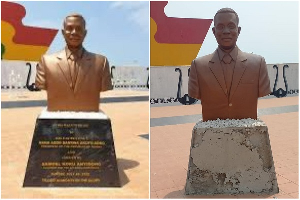The Auditor-General says more than $8.3 million revenue has been lost due to the failure to enforce penalties on delayed payment of surface rental by oil companies.
In contravention of Section 3 of Petroleum Revenue Management Act, 2011 (Act 815), the Auditor-General observed that companies which defaulted on their payments were not charged penalties or interest for late payments.
Section 3 of the Petroleum Revenue Management Act, 2011 (Act 815) states that “where the liability of an entity to make a payment is not discharged on or before the due date, the entity shall pay as a penalty, an additional five per cent of the original amount for each day of default or the default rate established under any other law, whichever is higher”.
This finding was contained in the Auditor-General report on the management of petroleum funds for the period, January 1, 2022, to December 31, 2022.
The report indicated that as of December 31, 2022, the total amount due from surface rentals was US$2.8 million representing 80 per cent of estimated receipts from surface rentals in the 2022 financial year.
It noted that US$1.8 million of the outstanding amount were owed by four contractors whose Petroleum Agreements were terminated by the Minister of Energy.
“Our review of correspondence received from Petroleum Commission disclosed that the total estimated proceeds for surface rentals at the end of the reporting period was US$3,461,825.95. The amount is made up of US$882,655 for the 2022 financial year and US$2,579,171 for the prior period’s outstanding amount. "
It was revealed that a total amount of US$687,759 was received from oil companies for surface rental operations in the 2022 financial year with US$71,935 of the amount received relating to terminated contract.
The Auditor-General has therefore urged the Ghana Revenue Authority (GRA) to ensure that all companies liable to make surface rental payments did so within the legally stipulated time frame.
It among other things called for requesting bank guarantees from prospecting companies such that any default by them could be mitigated and the performance of due diligence and robust Know Your Client (KYC) checks on all companies seeking to carry out oil business in Ghana.
“We also recommended that the Petroleum Commission and GRA should surcharge the defaulting companies in accordance with Section 3 of the PRMA 2011 (Act 815)”
According to the report, the GRA in its response to the issues raised, said it had initiated enforcement actions by issuing Demand Notices (DNs) to companies in default while taking the necessary steps to pursuit all tax liabilities and associated penalties.
The Petroleum Commission on the other hand indicated that it withheld certain approval requests from defaulting contractors such as license extensions, annual work programme and budget, among others.
It said it would provide the GRA with the needed assistance to assess and collect penalty charges.
Business News of Monday, 7 August 2023
Source: GNA

















